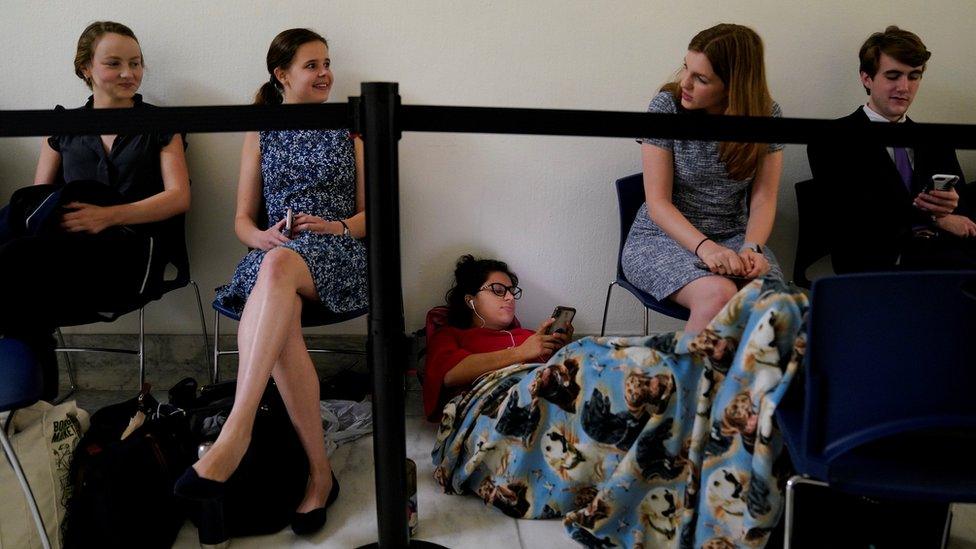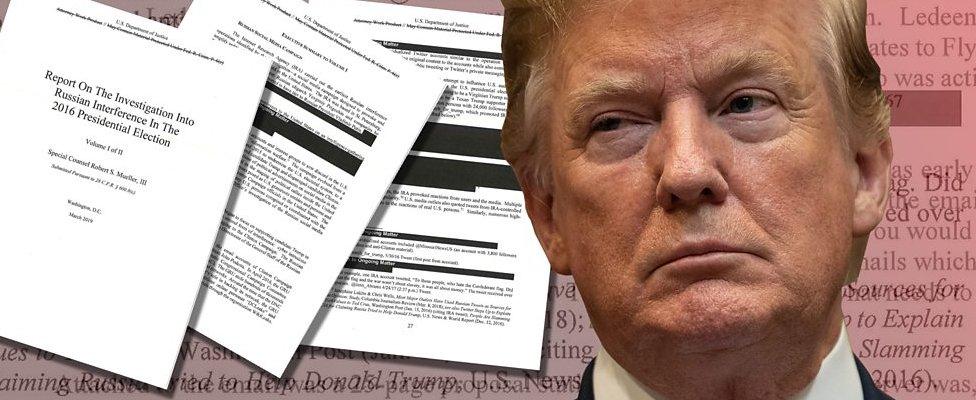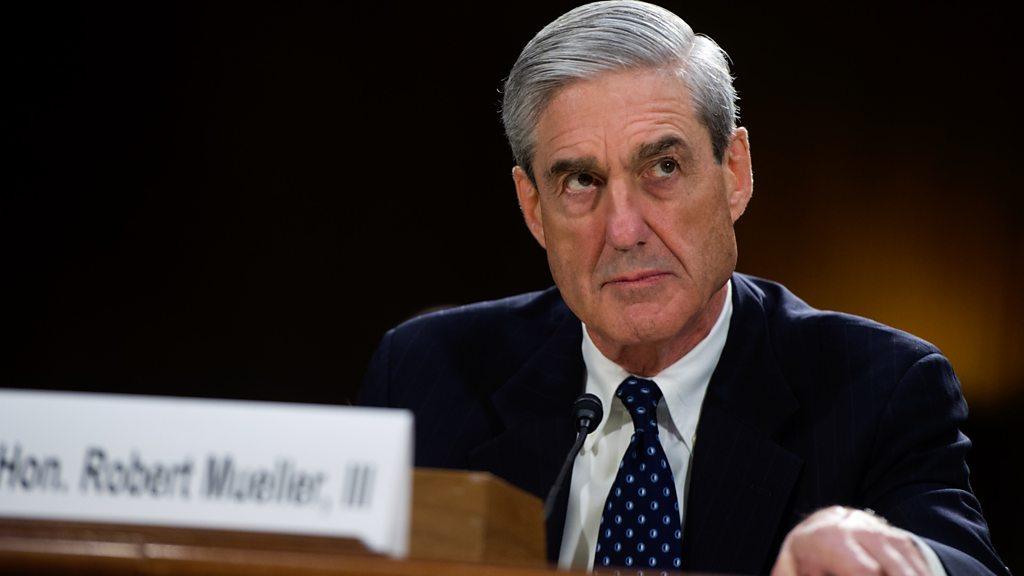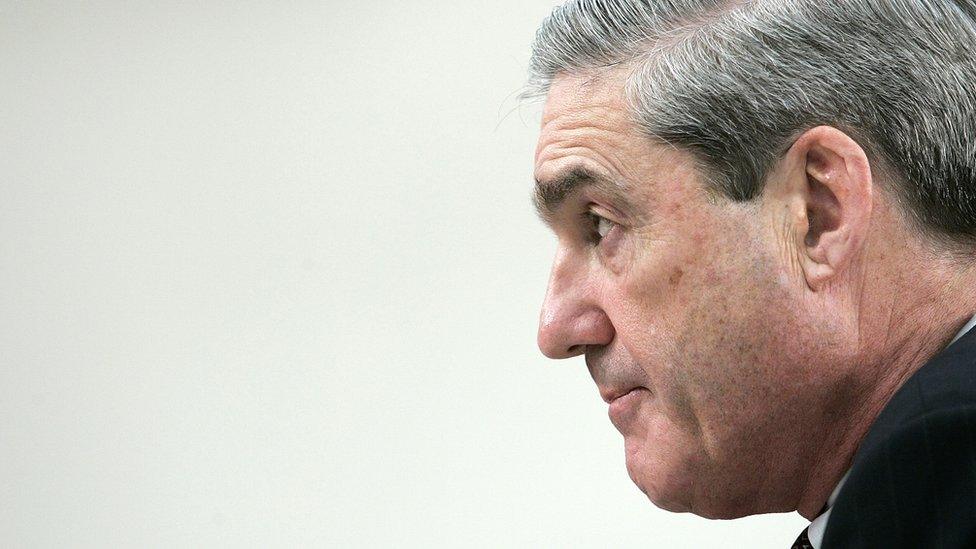Trump-Russia investigation: Mueller set to testify before Congress
- Published
Did the president refuse to be interviewed? Yes, says Mueller.
Robert Mueller, the former FBI director who investigated alleged Russian interference in the 2016 US election, is to testify before Congress.
He will face questions at two hotly anticipated hearings, with the first set to begin at 08:30 (12:30 GMT).
Mr Mueller was reluctant to testify but agreed to do so after two committees issued subpoenas.
His testimony comes three months after he released a detailed report on Donald Trump's campaign and Russia.
Mr Mueller's 448-page report said his investigation had not established that the Trump campaign criminally conspired with Moscow to influence the election.
But it did detail 10 instances where Mr Trump had possibly attempted to impede the investigation.
Mr Mueller will likely face questions on these instances of obstruction, alleged Russian election meddling, the behaviour of the FBI, and whether the president could have been charged with a crime.
What to look out for:
Signs of whether Mr Mueller was unhappy with Attorney General William Barr's controversial summary of the report
Reasons why the investigation did not specifically rule on whether the president had obstructed justice
Any response from Mr Mueller to accusations of bias in his team
What will happen?
Mr Mueller will appear before the House Judiciary Committee for around three hours. After a short break, he will then face two hours of questioning in front of the House Intelligence Committee.
The Democratic chairmen of both committees, Jerry Nadler and Adam Schiff respectively, will lead the questioning. Republican committee members will then ask questions of their own.

Some people camped out overnight ahead of the hearings
Although this is the first time Mr Mueller has answered questions publicly on the report, he is unlikely to drop any bombshells.
This is because he has vowed to stick closely to its contents. "The report is my testimony, " he said in May. "I would not provide information beyond that which is already public in any appearance before Congress."
Mr Mueller "will stick to the four walls of the report", his spokesman clarified earlier this week.

Three quick questions on the Mueller report
What came of the investigation?
In all, 35 people and three companies were charged by the special counsel on matters relating both directly and indirectly to alleged Russian interference in the 2016 election. No members of the Trump family were charged.
What's happening with it?
The special counsel investigation is over, with some cases (like that of Trump aide Roger Stone) still rumbling through the courts. But congressional investigations are still going on, with no significant revelations emerging from them so far.
Is Trump going to be impeached?
Some Democrats continue to make this case, but there's no enthusiasm for pursuing impeachment among party leaders. Even if there was, and impeachment proceedings were launched in the Democrat-controlled House, they'd probably flounder in the Republican-controlled Senate.

What questions will be asked?
That depends on who is asking. Democrats and Republicans have very different expectations for these high-profile, televised, hearings.
On one hand, Democrats are expected to ask in greater detail about the instances where Mr Trump may have attempted to impede the investigation.
They will probably attempt to push Mr Mueller into stating outright whether the president could have been charged with obstruction, if not for the legal restrictions on prosecuting a sitting president.
The Mueller report - in 60 seconds
The relationship between Attorney General William Barr and Mr Mueller's team will also come under scrutiny. Earlier this year, it emerged that Mr Mueller had written to Mr Barr and expressed frustration that the attorney general's summary of his report had not captured the full context of its findings.
Democrats, analysts say, will ask about Mr Mueller's widely reported frustrations with the Department of Justice.
Republicans, however, are likely to grill the former special counsel about the length and resources his almost two-year investigation used.
They are also expected to emphasise that the investigation - long branded a "partisan witch hunt" by Mr Trump - has ended and so the issue should be dropped.
Our best material on the Mueller report

The Mueller report was 448 pages long, and many members of Congress say they haven't read it - we condensed it into eight key points
Why did Trump not face obstruction charges? It's complicated. We explained why here.
Who is who in the Russia investigation? It's a large cast, with several seasons of plot.
- Published22 July 2019

- Published23 July 2019

- Published24 July 2019
